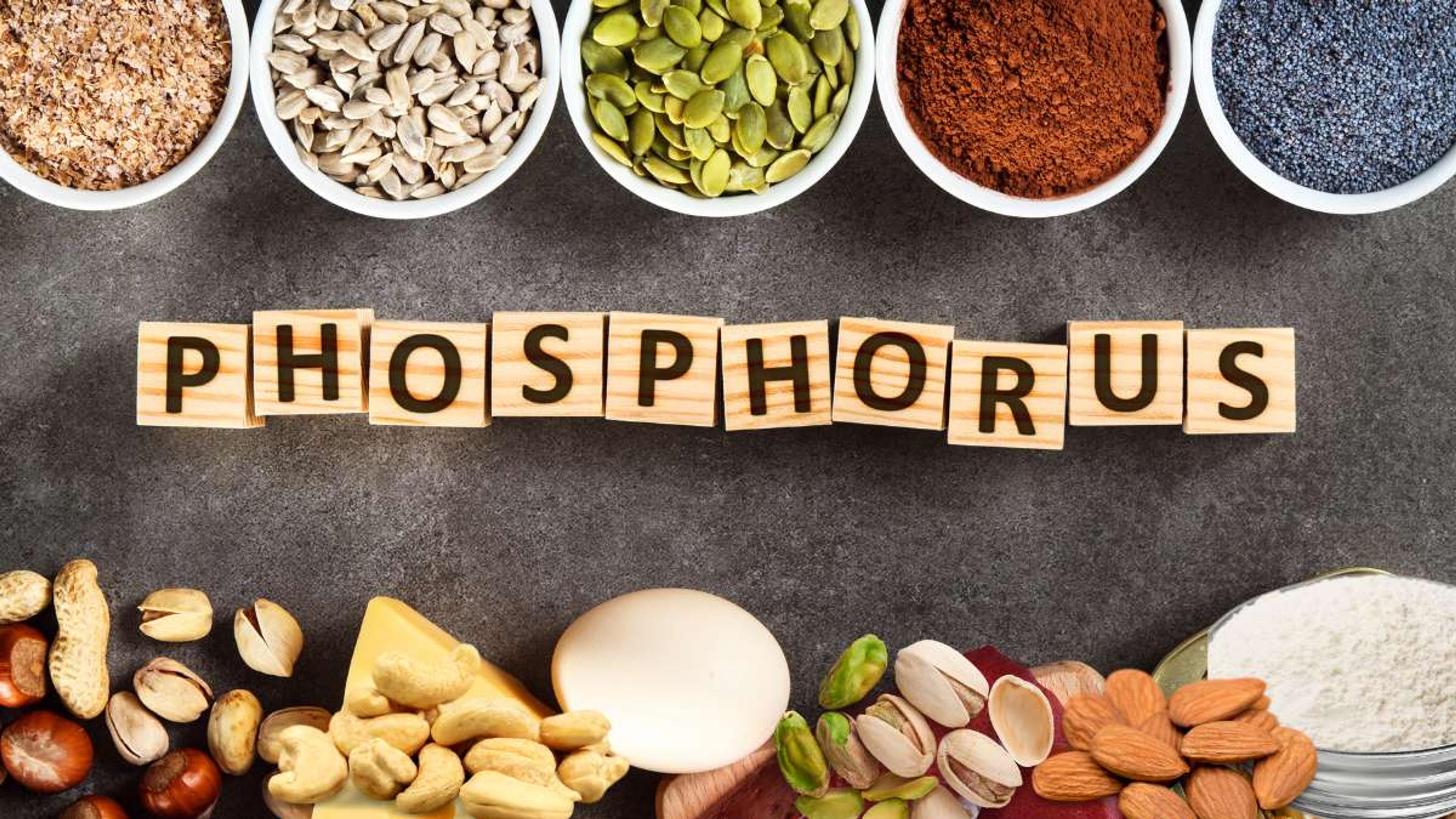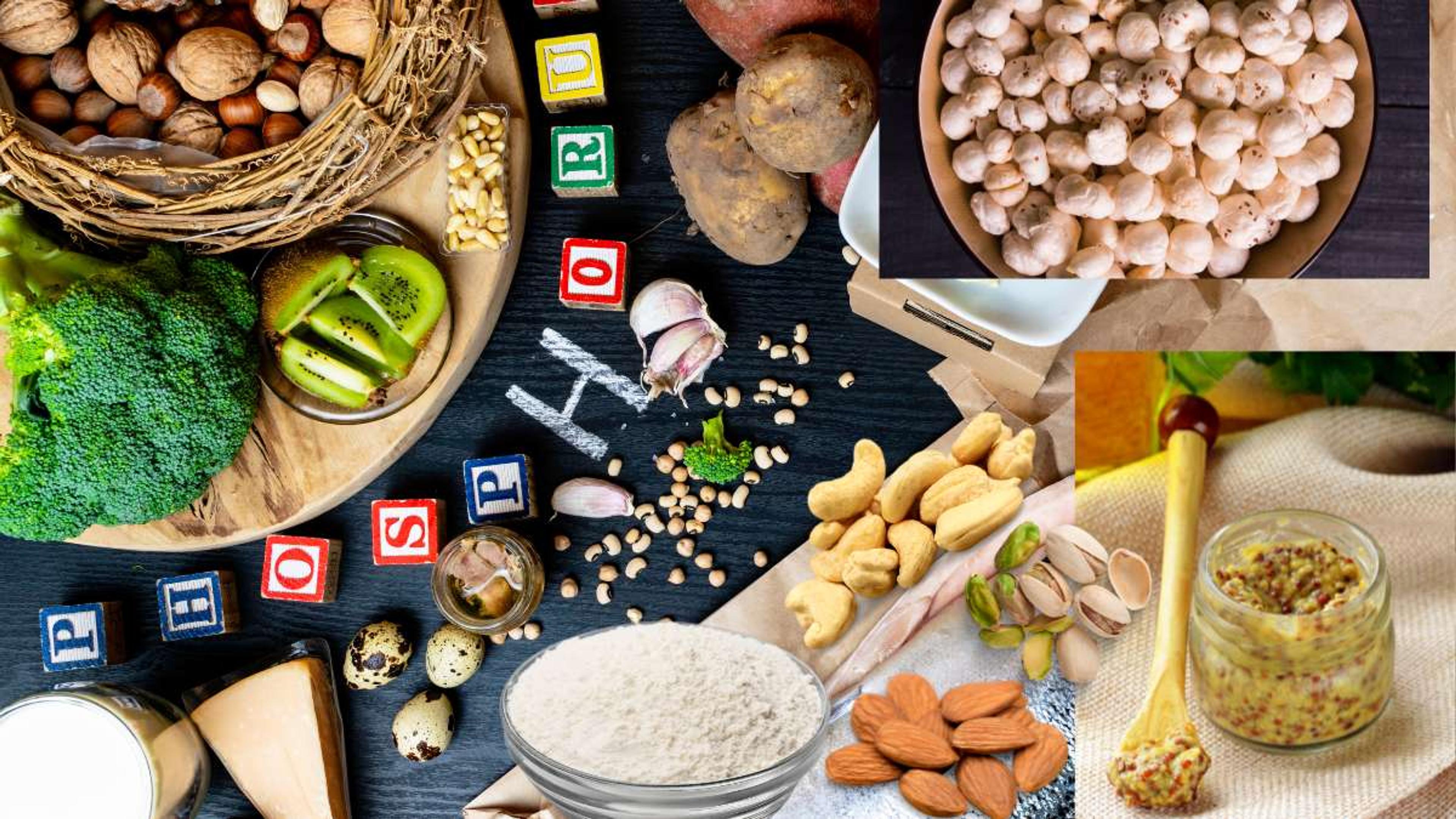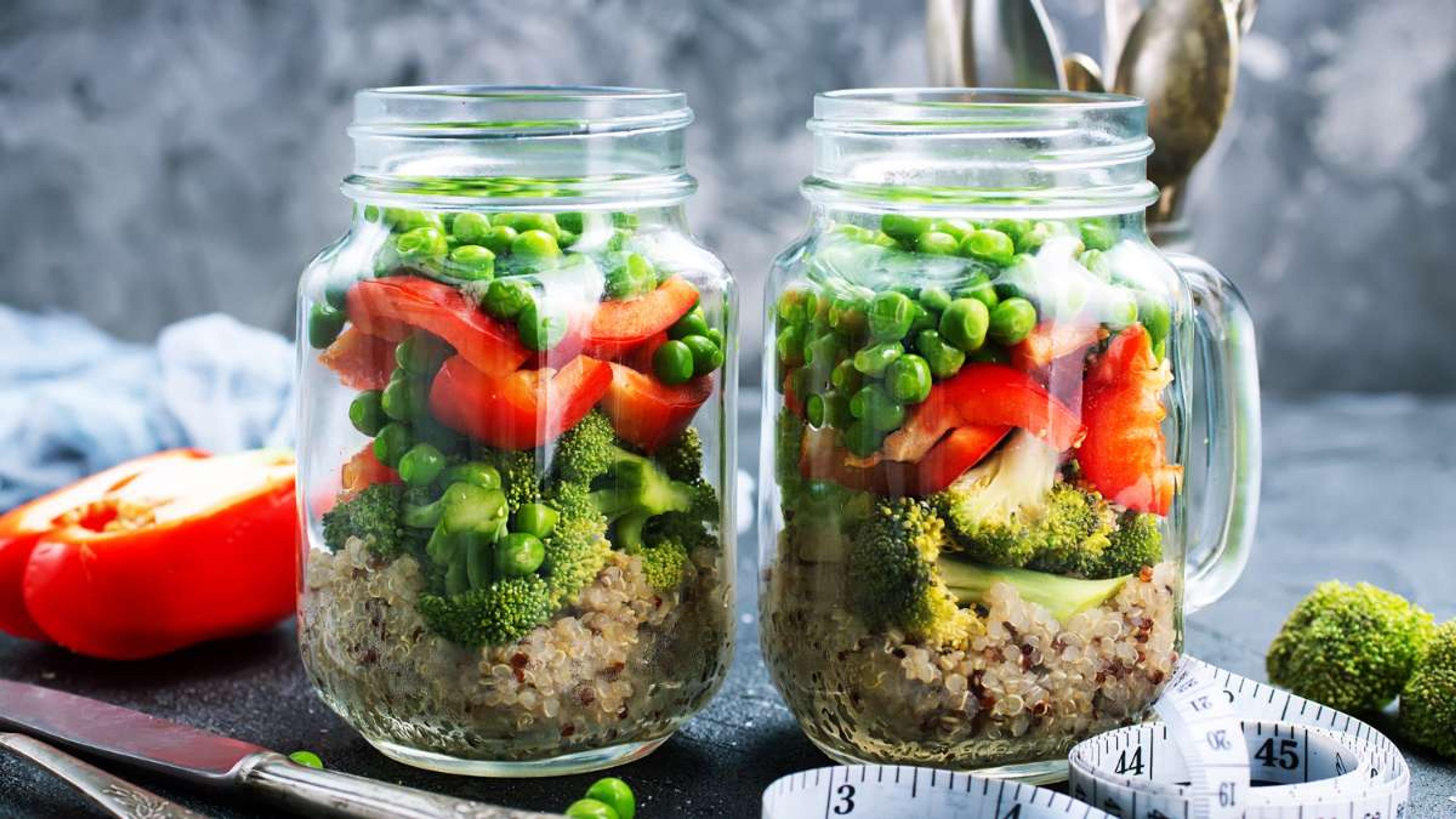The Ultimate Guide to Top 20 Vegan Sources of Phosphorus

- Key Takeaways
- Vegan Food Sources High in Phosphorus
- The Vegan Diet and Phosphorus
- Tips for Incorporating Phosphorus-Rich Foods into your Vegan Diet
- Conclusion
- FAQs
Are you struggling to find plant-based sources of phosphorus? Here's a fact: this essential mineral is abundant in many vegan foods. This blog post will guide you through various nutrient-rich options that cater to your dietary needs as a vegan, highlighting the importance of phosphorus and how it impacts your health.
Let’s dive into the world of plant-powered nutrition!
Key Takeaways
- Hemp seeds, pumpkin seeds, chia seeds, and a variety of nuts are excellent vegan sources of phosphorus.
- These plant-based foods not only provide ample amounts of phosphorus but also offer additional health benefits due to their nutrient content.
- Incorporating these vegan sources of phosphorus into your diet can help ensure you meet your daily intake requirements for this essential mineral.
Vegan Food Sources High in Phosphorus
Some vegan food sources high in phosphorus include hemp seeds, raw pumpkin seeds, sunflower seeds, poppy seeds, chia seeds, wheat germ, Dijon mustard, baking powder, peanut flour, Brazil nuts, soy flour.

1. Hemp Seeds
Hemp seeds standout as a fantastic vegan source of phosphorus. Not only do they provide 405 milligrams of this essential mineral per serving, they also come packed with potassium, magnesium, and calcium.
These minute powerhouses are rich in key fatty and amino acids necessary for maintaining optimal health. They even promote hair growth! So next time you're planning your plant-based meals, don't forget to add some hemp seeds into your dishes for an effortless nutrient boost.
2. Raw Pumpkin Seeds
Raw pumpkin seeds are a powerhouse of nutrition, especially for vegans. They provide an excellent source of phosphorus, critical for metabolism and enzyme function in the body. This humble seed is rich in other essential minerals as well such as magnesium, manganese, copper, zinc and iron.
Not only do raw pumpkin seeds bring significant nutritional value but they also pack a punch with protein. Each serving contains 5.3g of it! Their high phosphorus content makes them one of the top plant-based foods to add in your diet if you're aiming to meet your daily intake requirements effectively.
Easily incorporated into various dishes or eaten plain as a snack, these small seeds definitely deliver big on health benefits.
3. Sunflower Seeds
Sunflower seeds stand strong as a rich source of phosphorus in the vegan diet. Every ounce of these crunchy kernels boasts roughly 26-27% of the daily value for this essential mineral.
Apart from phosphorus, they also pack a nutritional punch with overflowing amounts of vitamins and minerals including folate, copper, manganese, and an impressive amount of vitamin E.
A mere two tablespoons provide about 2g protein and 4.75g fat - mainly beneficial poly and monounsaturated fats that contribute to heart health. Integrating sunflower seeds into your meals is straightforward - sprinkle them over salads or bake them into breads to amp up nutrition, or enjoy them roasted as a nutritious snack on-the-go.
4. Poppy Seeds
Poppy seeds are a great addition to a vegan diet as they are high in phosphorus. These tiny black seeds contain lignans, which are compounds found in various plant foods that provide phosphorus.
Not only do poppy seeds offer a unique flavor to dishes, but they also contribute to a well-balanced plant-based diet by providing an additional source of phosphorus. Whether sprinkled on top of baked goods or added to salad dressings, poppy seeds can be a versatile ingredient in vegan recipes.
5. Chia Seeds
Chia seeds are a nutrient-packed superfood that provides numerous health benefits. These tiny seeds are an excellent source of protein, with levels ranging from 860-919 mg per 100g.
In addition to their high phosphorus content, chia seeds also contain calcium, magnesium, and ALA (alpha-linolenic acid), which have been linked to improved bone mineral density. With their rich amino acids, fiber, manganese, and calcium profile, chia seeds make a great addition to any vegan diet.
Not only that, but they also boast an impressive amount of omega-3 fatty acids for heart health and inflammation reduction.
6. Wheat Germ
Wheat germ is a vegan food source that is rich in phosphorus. It also contains other important minerals like zinc, manganese, and magnesium. In fact, one cup of wheat germ provides approximately 968mg of phosphorus.
Not only is wheat germ packed with nutrients, but it is also a well-known plant-based protein source. Adding wheat germ to your diet can help ensure you meet your body's phosphorus needs and enjoy the benefits of this essential mineral.
(Note: The importance of wheat germ as a vegan source high in phosphorus has been highlighted without directly wrapping up or summarizing the points.)
7. Dijon Mustard
Dijon mustard is an excellent vegan source of phosphorus, containing 52mg per tablespoon. Made from mustard seeds, which are high in calcium, magnesium, potassium, and phosphorus, Dijon mustard can be used to add flavor and increase the phosphorus content in vegan meals.
It not only enhances the taste but also provides a significant amount of this essential nutrient for maintaining bone health and supporting various metabolic functions in the body.
Whether you use it as a condiment or incorporate it into dressings and marinades, Dijon mustard is a great way to boost your phosphorus intake on a vegan diet.
8. Baking Powder
Baking powder, a common ingredient in many baked goods, is a vegan food source that is high in phosphorus. Most store-bought baking powders contain phosphorus additives, which can provide an additional boost of this essential mineral.
However, it's important to note that if you have certain health conditions, such as kidney disease, baking powder with phosphorus additives may not be suitable for you. Phosphorus plays a crucial role in various biological processes within the body and incorporating baking powder into your vegan diet can help ensure adequate intake of this important nutrient.
9. Peanut Flour
Peanut flour is a fantastic vegan source of phosphorus, containing 456mg in just one cup. This makes up about 65% of the recommended daily intake of phosphorus. Not only that, but peanuts and peanut butter are also rich in vitamin E and fiber.
Incorporating peanut flour into your plant-based diet can help ensure you're getting the right amounts of this essential nutrient while enjoying its various health benefits.
10. Brazil Nut
Brazil nuts are an excellent source of phosphorus, with at least 16% of the daily value (DV) packed into just one ounce. If you enjoy a handful of Brazil nuts, you'll be getting about 140% of the recommended intake for adults in terms of phosphorus.
That's not all - these nuts also contain healthy fats, protein, fiber, and antioxidants like selenium. In fact, when it comes to selenium content, Brazil nuts are off the charts. Consuming Brazil nuts can help boost heart health and provide a whopping 988% of the reference daily intake (RDI) for selenium.
So go ahead and add some brazil nuts to your diet for a nutrient-rich snack option!
11. Soy Flour
Soy flour is a vegan food source that is high in phosphorus. It is derived from whole soybeans and can be used as an alternative to traditional flours. Soy flour is a popular choice among vegetarians due to its high protein content and versatility in cooking.
Incorporating soy flour into your diet can help meet your dietary needs for phosphorus, especially if you follow a plant-based or vegan lifestyle. So go ahead and experiment with this nutritious ingredient in your baking and cooking endeavors!
12. Flaxseeds
Flaxseeds are a nutritional powerhouse, packed with phosphorus, magnesium, and calcium. They are also rich in protein and essential fatty acids, making them a valuable addition to any vegan diet.
In addition to their nutrient content, flaxseeds offer several health benefits and may reduce the risk of certain diseases. With low calorie and carbohydrate content, they can be enjoyed without guilt.
Furthermore, flaxseeds are an excellent source of dietary fiber, promoting digestive health and aiding in weight management. Incorporating flaxseeds into your meals is an easy way to boost your phosphorus intake while enjoying their many nutritional advantages.
13. Sesame Seeds
Sesame seeds are a great vegan source of phosphorus, containing about 18 percent of the recommended daily intake in just one ounce. Besides being high in phosphorus, sesame seeds also provide essential healthy fats.
These tiny seeds are packed with other beneficial nutrients like copper, manganese, calcium, magnesium, iron, zinc, and molybdenum. Adding sesame seeds to your dishes not only enhances flavor but also boosts your phosphorus intake.
So go ahead and sprinkle some on top of salads or use them as a garnish for stir-fries to reap their nutritional benefits.
14. Nutritional Yeast
Nutritional yeast is a vegan and gluten-free source of nutrients that can be a beneficial addition to a vegan diet. It is known for its rich natural source of protein, enzymes, peptides, amino acids, carbohydrates, and B vitamins.
In fact, one tablespoon of nutritional yeast contains approximately 76mg of phosphorus. Not only does it provide essential nutrients like phosphorus, but some nutritional yeast products are also fortified with B vitamins, including vitamin B12 which is often lacking in a vegan diet.
With its nutrient content and versatility in cooking and baking, nutritional yeast can be an excellent choice for vegans looking to boost their phosphorus intake while enjoying delicious plant-based meals.
15. Lotus Seeds
Lotus seeds are a vegan food source that is packed with phosphorus, making them an excellent addition to your plant-based diet. Not only are they high in phosphorus, but they also provide protein and fiber for a well-rounded nutritional boost.
Additionally, lotus seeds contain important micronutrients like calcium, magnesium, iron, and manganese. They're even rich in vitamins such as zinc and calcium. Including lotus seeds in your meals can help ensure you're getting the right amounts of these essential nutrients for overall health and wellbeing.
16. Cashews
Cashews are a vegan food source high in phosphorus. These delicious nuts are not only tasty but also pack a nutritional punch. Cashews contain other essential nutrients like protein, healthy fats, and vitamins, making them a great addition to any vegan diet.
They are often used in plant-based cheese making as they provide a creamy texture and richness. Including cashews in your meals ensures that you're getting the right amounts of phosphorus, which is vital for bone health and metabolism.
So go ahead and enjoy some crunchy cashews as part of your balanced vegan eating plan!
17. Pine Nuts
Pine nuts are a nutrient-rich food that can be a valuable addition to a vegan diet. These small, creamy nuts are especially known for their high phosphorus and magnesium content. In fact, among all nuts and oil-bearing seeds, pine nuts have the highest amount of phosphorus.
Additionally, pine nuts are an excellent source of protein, containing more than any other plant food. They also contain vitamin K, zinc, manganese, polyunsaturated fat, vitamins B1 and E, iron, and other essential minerals.
Just one ounce of pine nuts provides approximately 18% of the recommended daily intake of magnesium. So if you're looking to boost your phosphorus intake on a vegan diet while enjoying a tasty snack or ingredient in your recipes - consider adding some pine nuts to your plate!
18. Pili Nuts
Pili nuts are a fantastic vegan source of phosphorus, containing 690mg per cup. These delicious nuts are not only high in phosphorus but also packed with other essential minerals like magnesium, calcium, manganese, and copper.
In addition to providing important nutrients for overall health, pili nuts can help strengthen bones due to their mineral content. They are also rich in vitamin E and thiamin, making them a nutritious and tasty snack option.
What sets pili nuts apart is their impressive magnesium content – they have more magnesium compared to most other types of nuts. Incorporating pili nuts into your vegan diet is an excellent way to boost your phosphorus intake while enjoying a flavorful treat.
19. Almonds
Almonds are an excellent vegan source of phosphorus, providing a range of health benefits. In just one ounce of almonds, you'll find approximately 165 calories, 6 grams of protein, 14 grams of fat, 6 grams of carbohydrates, and 3 grams of fiber.
Apart from being high in phosphorus content, almonds also contain essential nutrients such as calcium, magnesium, manganese copper, vitamin K, protein, and zinc that contribute to maintaining healthy bones.
By including almonds in your vegan diet along with other plant-based foods rich in phosphorous like hemp seeds and chia seeds., you can ensure adequate intake while enjoying the many nutritional benefits they offer.
20. Pistachios
Pistachios are a nutrient-rich food, particularly when it comes to phosphorus. This mineral is essential for maintaining healthy bones and teeth. In fact, a 100 gram serving of pistachios contains more phosphorus than copper and manganese.
For those looking to increase their phosphorus intake, pistachios are a great choice. Just one ounce of pistachios provides 137 mg of phosphorus, making them an excellent snack option.
In fact, consuming one cup of pistachios can offer as much as 577 mg of phosphorus, which is about 82% of the daily value for adults. Whether enjoyed on their own or used in recipes, pistachios make it easy to incorporate this important nutrient into your diet.
The Vegan Diet and Phosphorus

Vegans need to be mindful of their phosphorus intake and ensure they are getting enough through plant-based sources. It is important for vegans and vegetarians to include sufficient amounts of phosphorus in their diets because it plays a crucial role in maintaining strong bones and teeth, as well as supporting overall cellular function.
Aside from almonds and pistachios, there are several other vegan sources of phosphorus that can help meet your daily requirements. One such source is legumes. Lentils, chickpeas, and kidney beans are all excellent options that not only provide phosphorus but also offer a good amount of protein and fiber.
Whole grains, such as quinoa and brown rice, are another great way to incorporate phosphorus into your diet. These grains not only contain phosphorus but also packed other essential nutrients.
How Much Phosphorus Do Vegans Need?
Adults on a vegan diet need approximately 550 milligrams of phosphorus per day. This essential nutrient can be obtained through various plant-based sources, ensuring that vegans can meet their daily requirements.
Studies have shown that vegan diets are not associated with deficiencies in phosphorus, and in fact, serum phosphorus levels tend to decrease more in a vegetarian or plant-based diet compared to meat-based diets.
By including phosphorus-rich foods like hemp seeds, raw pumpkin seeds, sunflower seeds, chia seeds, wheat germ, and nutritional yeast into their meals, vegans can easily meet their recommended daily intake of this important mineral.
Benefits of Phosphorus in a Vegan Diet
Phosphorus plays a crucial role in the vegan diet, offering a range of benefits for overall health and wellbeing. One key benefit is its role in energy metabolism, helping to release energy from the foods we consume.
Additionally, phosphorus supports proper cell function and helps maintain healthy bones and teeth. It also aids in kidney function by promoting filtration and excretion of waste products.
By including phosphorus-rich plant-based foods in their diet, vegans can ensure they are meeting their nutritional needs while reaping the benefits that this essential mineral provides for optimal health.
The Vegan Diet and Phosphorus Deficiency
Phosphorus is an important mineral that plays a vital role in our overall health, including bone formation and energy metabolism. While the vegan diet can provide ample sources of phosphorus, it's important to be aware of the potential for phosphorus deficiency.
Vegans need to ensure they are getting enough phosphorus through plant-based foods like beans, lentils, nuts, and whole grains.
Phytate is the main storage form of phosphorus in many vegan staples such as cereals, legumes, and nuts. However, phytic acid can hinder the absorption of phosphorus in our bodies.
Therefore, it's essential for vegans to consider factors that enhance phosphorus absorption. Additionally, because plant-based diets generally contain more fiber than animal-based diets, vegans may have higher excretion rates of phosphorus.
If you're following a vegan diet and concerned about your phosphorus intake or experiencing symptoms like bone loss or muscle weakness associated with low levels of this mineral, consulting a registered dietitian may be beneficial.
Tips for Incorporating Phosphorus-Rich Foods into your Vegan Diet
Incorporate phosphorus-rich foods into your vegan diet with these helpful tips.

Meal Planning and Recipe Ideas
One way to ensure that you are getting enough phosphorus in your vegan diet is through meal planning and incorporating phosphorus-rich foods into your recipes. Start by making a list of the vegan foods that are high in phosphorus, such as hemp seeds, chia seeds, and almonds.
Then, create a weekly meal plan that includes these foods in various dishes. For example, you could make overnight oats with chia seeds for breakfast or add hemp seeds to your smoothies.
You can also experiment with different recipes using ingredients like tofu or tempeh (which are also good sources of phosphorus) and include nuts like cashews or almonds for added flavor and nutrients.
By being creative with your meal planning and recipe ideas, you can easily meet your recommended daily intake of phosphorus while enjoying delicious plant-based meals.
Another tip for incorporating more phosphorus-rich foods into your diet is to pair them strategically with other ingredients that enhance their absorption. For example, pairing vitamin C-rich fruits like oranges or strawberries with iron-rich spinach not only adds flavor but also helps increase the absorption of iron from the spinach.
Similarly, combining plant-based sources of calcium (like kale or broccoli) with high-phosphorous ingredients can help optimize nutrient uptake in your body. Try adding sesame seeds to a stir-fry dish made with calcium-rich vegetables or sprinkle pumpkin seeds on top of a salad made with leafy greens for a tasty boost of both nutrients.
Remember to vary your cooking and preparation techniques when working with phosphorus-rich foods as well. Cooking methods such as boiling may cause some loss of nutrients like vitamins B and C; instead, consider steaming vegetables to retain more nutritional value.
Grinding nuts/seeds into flour form before using them in baking recipes can also be an effective way to incorporate their goodness without altering taste preferences significantly.
Food Pairing for Enhanced Phosphorus Absorption
Pairing certain foods together can enhance the absorption of phosphorus in your body. For example, consuming iron-rich foods along with foods that are high in vitamin C and organic acids can optimize iron absorption.
Similarly, combining plant-based sources of phosphorus with foods that contain phytic acid, such as whole grains and legumes, may help to increase the bioavailability of phosphorus.
By strategically pairing these foods in your meals, you can ensure that your body is able to absorb and utilize phosphorus more effectively.
Cooking and preparation techniques are essential for maximizing the phosphorus content in vegan foods. Roasting or toasting nuts and seeds can help enhance their flavors while retaining their nutritional value.
Soaking legumes, such as chickpeas or black beans, before cooking can reduce their phytic acid content and increase phosphorus absorption. Steaming leafy greens like spinach or kale helps preserve their nutrients while making them more digestible.
Additionally, blending fruits and vegetables into smoothies can be a convenient way to incorporate phosphorus-rich ingredients into your diet. By implementing these techniques, you can ensure that your meals are not only delicious but also packed with beneficial amounts of phosphorus.
Conclusion
In conclusion, vegans have a wide range of plant-based sources to choose from when looking to incorporate phosphorus into their diet. Foods such as hemp seeds, pumpkin seeds, chia seeds, and nuts like almonds and cashews can provide ample amounts of this essential mineral.
With proper meal planning and food pairing techniques, getting enough phosphorus on a vegan diet is both achievable and beneficial for overall health.
FAQs
1. What are some vegan sources of phosphorus?
Some vegan sources of phosphorus include legumes, nuts and seeds, whole grains, tofu, tempeh, and certain fruits and vegetables like broccoli and potatoes.
2. Can I get enough phosphorus on a vegan diet?
Yes, it is possible to get enough phosphorus on a vegan diet by including a variety of plant-based foods that are rich in this essential nutrient.
3. Are there any specific food combinations that can enhance the absorption of phosphorus in vegan diets?
Combining plant-based sources of phosphorus with vitamin D-rich foods or ingredients high in citric acid can enhance the absorption of phosphorus in a vegan diet. For example, pairing fortified plant milks with vitamin D-fortified cereals or consuming lemon juice with legume dishes.
4. Are there any risks associated with consuming too much phosphorus from vegan sources?
Consuming excessive amounts of phosphorus from supplements or highly processed foods may have negative health effects. It is recommended to obtain most of your dietary phosphorus from whole food sources to maintain a balanced intake and avoid potential risks.

